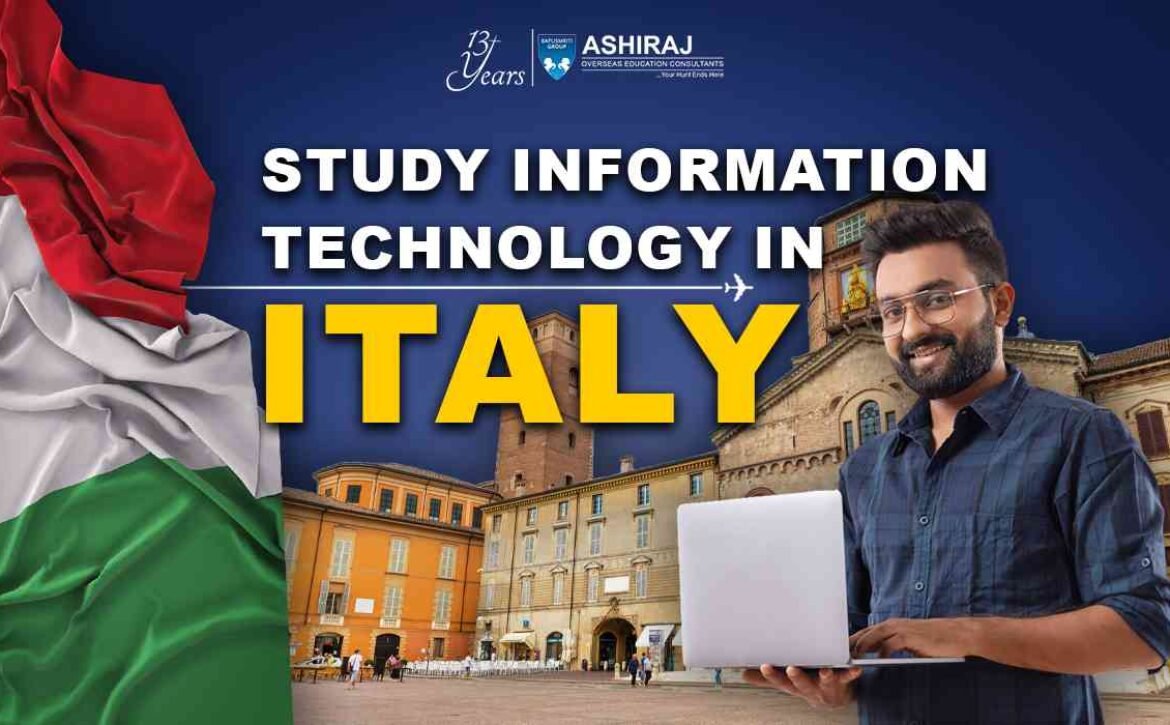
Information Technology in Italy
Italy stands as a vibrant hub for Information Technology (IT), seamlessly blending centuries-old charm with cutting-edge technological advancements. In recent years, Information Technology in Italy has burgeoned into a dynamic sector, reflecting the nation’s commitment to innovation and digital transformation. From Milan’s bustling tech start-up scene to Rome’s flourishing IT infrastructure, Italy offers a diverse landscape for technological progress. With Information Technology in Italy at its core, the nation leverages its rich cultural heritage and entrepreneurial spirit to foster a thriving IT ecosystem.
The emergence of Italy as a prominent player in Information Technology stems from a convergence of factors, including strategic investments in research and development, robust educational programs, and a supportive regulatory environment. Government initiatives aimed at promoting digital literacy and enhancing broadband connectivity have further propelled Italy’s IT sector onto the global stage. As Information Technology in Italy continues to gain momentum, the nation stands poised to lead the charge in shaping the future of technology both regionally and internationally.
Why to Study Information Technology in Italy?
- Innovation Hub: Italy boasts a thriving IT sector, making it an ideal destination for students seeking exposure to cutting-edge technologies and innovative projects.
- Cultural Experience: Studying IT in Italy offers a unique blend of academic rigor and cultural immersion. Students can explore historic cities while gaining valuable skills in a diverse and dynamic environment.
- Quality Education: Italian universities are renowned for their high academic standards and world-class faculty in the field of Information Technology. Students can expect top-notch education that prepares them for global career opportunities.
- Global Networking Opportunities: Italy’s IT industry is interconnected with global markets, providing students with ample networking opportunities and exposure to international professionals and companies.
- Industry-Relevant Curriculum: Universities in Italy offer comprehensive IT programs designed to equip students with the latest industry knowledge and practical skills demanded by employers worldwide.
- Career Prospects: Graduates with a degree in Information Technology from Italy are highly sought after by employers due to the country’s reputation for excellence in technology and innovation.
- Scholarship Opportunities: Many Italian universities offer scholarships and financial aid to international students, making studying IT in Italy more accessible and affordable.
- Language Advantage: Studying in Italy provides students with the opportunity to learn or improve their proficiency in Italian, a valuable skill in the global job market.
- Cultural Diversity: Italy attracts students from all over the world, fostering a multicultural learning environment that promotes collaboration and cross-cultural understanding.
- Gateway to Europe: With its strategic location in Europe, studying IT in Italy opens doors to career opportunities not only within the country but also across the European Union.
By choosing to study Information Technology in Italy, students can embark on a transformative educational journey that combines academic excellence with cultural enrichment, preparing them for success in the dynamic field of technology.
Top Universities to Study Information Technology in Italy
University Name | QS Ranking (2023) | Type of University | Average Annual Fees (EUR) | Programs Offered |
Politecnico di Milano | 1st | Public | €3,000 – €4,000 | Computer Science, Information Technology |
Università degli Studi di Roma – La Sapienza | 2nd | Public | €2,000 – €3,000 | Computer Engineering, Information Systems |
Università di Bologna | 3rd | Public | €2,500 – €3,500 | Computer Science, Data Science |
Università degli Studi di Milano | 4th | Public | €2,000 – €3,000 | Information Technology, Software Engineering |
Università degli Studi di Padova | 5th | Public | €2,500 – €3,500 | Cybersecurity, Artificial Intelligence |
Italy stands at the forefront of Information Technology (IT) education, with its top universities consistently ranking high globally. Here’s a list of the top universities in Italy for Information Technology according to the QS World University Rankings 2023, along with their average annual fees and programs offered. These institutions provide a diverse range of programs in IT-related fields, ranging from computer science to cybersecurity, preparing students for successful careers in the ever-evolving technology industry. With their academic excellence, research opportunities, and affordable tuition fees, these universities offer an ideal environment for students aspiring to excel in Information Technology in Italy.
Course Curriculum for Information Technology in Italy
- Core Concepts: The course curriculum of Information Technology in Italy covers fundamental concepts such as computer programming, data structures, algorithms, and database management systems.
- Specialized Tracks: Students have the option to specialize in areas like cybersecurity, artificial intelligence, software engineering, and network administration, tailoring their education to their career goals.
- Practical Training: Emphasis is placed on practical training through hands-on projects, internships, and industry collaborations, providing students with real-world experience and skills.
- Emerging Technologies: The curriculum is updated regularly to incorporate the latest trends and advancements in Information Technology, ensuring that students are well-versed in cutting-edge technologies.
- Interdisciplinary Approach: Many programs integrate interdisciplinary coursework, allowing students to explore the intersection of IT with fields such as business, healthcare, and engineering.
- Soft Skills Development: Alongside technical skills, the curriculum also focuses on developing soft skills such as communication, problem-solving, and teamwork, essential for success in the IT industry.
- Research Opportunities: Students are encouraged to engage in research projects under the guidance of faculty members, fostering innovation and critical thinking.
- Global Perspective: The curriculum often includes components that promote global awareness, such as study abroad programs and international collaborations, preparing students for careers in the globalized IT landscape.
Eligibility Criteria & Admission Requirements for MS in Information Technology in Italy
- Language Proficiency: Applicants must demonstrate proficiency in English by providing either IELTS or TOEFL scores. Minimum scores typically range from 6.0 to 7.0 for IELTS and 80 to 100 for TOEFL.
- Standardized Tests: Most universities require applicants to submit GRE or GMAT scores. The minimum score varies across institutions, with GRE scores typically ranging from 310 to 330 and GMAT scores ranging from 600 to 700.
- Academic Certificates: Applicants are required to submit their academic certificates, including transcripts and diplomas, demonstrating completion of relevant prerequisites such as a bachelor’s degree in IT or a related field.
- Work Experience: While not always mandatory, some universities may prefer candidates with relevant work experience in the IT industry. Work experience can strengthen an application and provide valuable insights into the field.
- Passport & Student Visa: International applicants must possess a valid passport and obtain a student visa to study in Italy. The visa application process typically requires proof of enrollment, financial stability, and medical insurance.
IELTS or TOEFL Scores (minimum):
Exam | Minimum Score |
IELTS | 6.5 |
TOEFL | 85 |
GRE or GMAT Scores (minimum):
Exam | Minimum Score |
GRE | 315 |
GMAT | 610 |
Meeting these eligibility criteria ensures that candidates are well-prepared to pursue a degree in Information Technology in Italy, contributing to their academic success and future career prospects.
Documents Required for Studying Information Technology in Italy
- Passport: A valid passport is essential for international students applying to study Information Technology in Italy. Ensure that your passport is valid for the duration of your intended stay.
- Two Letters of Recommendation (LOR): LORs from academic or professional references attest to your abilities, skills, and suitability for the program. Choose referees who can provide relevant insights into your academic or work performance.
- Statement of Purpose (SOP): The SOP outlines your academic and career goals, reasons for choosing the Information Technology program, and how it aligns with your aspirations. It allows the admissions committee to understand your motivations and aspirations.
- Curriculum Vitae (CV): Your CV highlights your educational background, work experience, skills, achievements, and extracurricular activities. Tailor your CV to emphasize your strengths and experiences relevant to Information Technology.
- Official High School Transcripts: Official transcripts from your high school or secondary education institution provide a comprehensive record of your academic performance and achievements.
- Educational Certificates: Submit copies of educational certificates, including diplomas or degrees, to verify your academic qualifications and eligibility for the Information Technology program.
- Work Experience Certificate: If applicable, provide a work experience certificate to demonstrate relevant professional experience in the field of Information Technology.
- Proof of Financial Resources: To obtain a student visa, you must demonstrate proof of financial resources to cover tuition fees, living expenses, and other costs associated with studying in Italy.
Gathering these documents is a crucial step in the application process for Information Technology in Italy, ensuring that you meet the requirements and present a strong application to your desired universities.
Admission Process for Information Technology in Italy
- Research Universities: Begin by researching universities in Italy offering Information Technology programs. Consider factors such as rankings, curriculum, faculty, and location.
- Check Eligibility: Ensure that you meet the eligibility criteria, including academic requirements, language proficiency (IELTS or TOEFL), and standardized test scores (GRE or GMAT).
- Prepare Application Materials: Gather required documents, including academic transcripts, certificates, standardized test scores, passport, and proof of financial stability.
- Submit Application: Complete the online application form for your chosen universities and upload all required documents. Pay attention to application deadlines and submission instructions.
- Wait for Response: After submitting your application, wait for the university’s response. This may take several weeks to months, depending on the university and program.
- Interview (if required): Some universities may require applicants to participate in an interview as part of the admission process. Prepare for the interview by researching the program and practicing potential questions.
- Receive Admission Decision: Once the university reviews your application, you will receive an admission decision. If accepted, follow the instructions provided to confirm your enrollment.
- Apply for Student Visa: Upon receiving admission, apply for a student visa from the Italian consulate or embassy in your country. Provide necessary documents, including proof of admission and financial resources.
- Arrive in Italy: Upon receiving your student visa, make necessary arrangements for travel and accommodation in Italy. Attend orientation programs provided by the university to familiarize yourself with campus life and academic procedures.
- Begin Your Studies: Start your journey in Information Technology in Italy by attending classes, engaging with faculty and peers, and immersing yourself in the vibrant academic and cultural atmosphere.
“Education is the most powerful weapon which you can use to change the world.”
Nelson Mandela
Cost of Information Technology Course in Italy
- Tuition Fees: Tuition fees for Information Technology programs in Italy vary depending on the university and the level of study (undergraduate or graduate). On average, tuition fees range from €2,000 to €4,000 per year for EU students and €4,000 to €8,000 per year for non-EU students.
- Living Expenses: Living expenses, including accommodation, food, transportation, and personal expenses, also contribute to the overall cost of studying in Italy. On average, students can expect to spend around €700 to €1,000 per month on living costs, depending on the city and lifestyle.
- Scholarships and Financial Aid: Many universities in Italy offer scholarships and financial aid to international students based on academic merit, financial need, or specific criteria. Students are encouraged to explore scholarship opportunities to help offset the cost of studying Information Technology in Italy.
- Health Insurance: Health insurance is mandatory for all students studying in Italy. The cost of health insurance varies depending on the provider and coverage options but typically ranges from €150 to €300 per year.
- Additional Expenses: Other expenses to consider include visa fees, books and study materials, travel expenses, and recreational activities. It’s essential to budget for these additional costs to ensure a comfortable and fulfilling experience while studying Information Technology in Italy.
Scholarships for Information Technology Courses in Italy
Scholarship Name | Amount | Application Deadline |
Italian Government Scholarships | Full tuition waiver | Varies |
EDISU Piemonte Scholarships | Up to €5,000 per year | June 30th |
Politecnico di Milano Merit-Based Scholarships | Partial tuition coverage | May 31st |
Università di Bologna Study Grants | Varies | April 15th |
Università degli Studi di Roma Scholarships | Up to €7,000 per year | May 15th |
Information Technology in Italy offers numerous scholarship opportunities for both domestic and international students, making higher education more accessible. These scholarships cover various expenses, including tuition fees, living expenses, and research costs. To maximize your chances of securing a scholarship, ensure that you meet the eligibility criteria and submit your application before the deadline. Additionally, consider exploring other scholarship options offered by private organizations, foundations, and non-profit institutions. Scholarships not only alleviate financial burdens but also recognize academic excellence and encourage students to pursue their passions in Information Technology.
Career Opportunities After Information Technology in Italy
Job Profile | Average Salary (EUR) |
Software Developer | €35,000 – €50,000 |
Data Analyst | €30,000 – €45,000 |
Network Engineer | €40,000 – €55,000 |
Cybersecurity Analyst | €45,000 – €60,000 |
IT Project Manager | €50,000 – €70,000 |
Information technology in Italy opens doors to diverse career opportunities with competitive salaries. From software development to cybersecurity, professionals in the IT sector are in high demand across various industries. Software developers can expect to earn between €35,000 to €50,000 annually, while data analysts command salaries ranging from €30,000 to €45,000. Network engineers and cybersecurity analysts enjoy higher salaries, ranging from €40,000 to €55,000 and €45,000 to €60,000, respectively. IT project managers, overseeing the planning and execution of IT projects, earn the highest salaries, ranging from €50,000 to €70,000. With continuous advancements in technology and increasing reliance on digital solutions, the demand for skilled IT professionals in Italy is expected to grow, offering lucrative career prospects for graduates in Information Technology.
Frequently Asked Questions About Information Technology in Italy
Some of the top universities in Italy offering Information Technology programs include Politecnico di Milano, Università degli Studi di Roma – La Sapienza, and Università di Bologna.
Eligibility criteria typically include academic qualifications, language proficiency (IELTS or TOEFL), standardized test scores (GRE or GMAT), and submission of required documents such as academic certificates and passport.
Yes, there are various scholarships available for studying Information Technology in Italy, offered by universities, government agencies, and private organizations. These scholarships cover tuition fees, living expenses, and research costs.
The cost of studying Information Technology in Italy includes tuition fees, living expenses, health insurance, and additional expenses. On average, tuition fees range from €2,000 to €8,000 per year, depending on the university and program.
Graduates of Information Technology programs in Italy can pursue careers as software developers, data analysts, network engineers, cybersecurity analysts, and IT project managers, among others, with competitive salaries ranging from €30,000 to €70,000 annually.
While work experience is not always mandatory, some universities may prefer candidates with relevant work experience in the IT industry. However, it varies depending on the university and program requirements.
The application process typically involves researching universities, checking eligibility criteria, preparing application materials, submitting online applications, waiting for admission decisions, and applying for a student visa.
Yes, many universities in Italy offer Information Technology programs taught entirely in English to accommodate international students. These programs ensure that language is not a barrier to obtaining a quality education in IT.
Popular specializations within Information Technology in Italy include cybersecurity, artificial intelligence, software engineering, data science, and network administration, catering to diverse career interests and industry demands.
Yes, international students in Italy are allowed to work part-time up to 20 hours per week during the academic year and full-time during holidays. However, they must ensure compliance with visa regulations and obtain necessary work permits.




